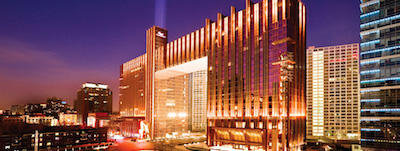 Four Seasons Johannesburg
Four Seasons Johannesburg
European mainstays are still the top fall and holiday travel destinations for affluent travelers, but African nations are picking up steam, according to Virtuoso travel network.
Among luxury travelers, Italy, France and the United Kingdom are the top three destinations based on future bookings, but South Africa follows in fourth place. Understanding where the affluent are traveling can help hotels maintain market share and help retailers plan expansion to otherwise reach these consumers.
"We continue to see multigenerational travel as the strongest trend, and that spans all the regions where we have travel agency partners (40 countries across the globe)," said Misty Ewing Belles, managing director, global public relations for Virtuoso.
"The fact that our Top 10 list included 3 African countries – Kenya, South Africa and Tanzania, all key safari destinations – is really no surprise," she said. "There was pent up demand for Africa following the Ebola scare, and now demand for safari is through the roof.
"Partners here at Virtuoso Week are saying December 2017 is fully booked, so anyone looking to go on safari needs to start planning now! And this demand has bolstered Africa to a 28% year-on-year jump.
Old destinations and new
Rounding out the top 10 are Spain, Mexico, China, Australia, New Zealand and Israel. Travelers are taking advantage of the devaluation of the British pound, allowing them to explore the U.K. for cheaper than in the past.
 Fairmont Beijing
By the same token, while the continued fear of terrorism may be steering a small group of consumers elsewhere, the subsequent drop in hotel rates and the weakened euro are enticing others. Mexico, Australia and New Zealand all remain popular as warm-weather alternatives once the northern hemisphere begins to cool.
Kenya stands atop Virtuosos’s “Hot 10,” with its 59 percent growth in year-over-year booking just edging out Iceland’s 56 percent. Saint Martin, China, Ecuador and Japan each grew by around one third, while South Africa, Tanzania, Croatia and Jamaica all saw around a 25 percent increase.
Africa as a whole is gaining tremendous popularity, with a 28 percent year-over-year growth. The rise in multigenerational travel has translated to increased demand for safaris. Iceland’s appeal has grown in recent years, with the continued success showing its popularity extending across the calendar as well.
"We know that TV and film can drive a destination’s popularity, and Iceland is most likely enjoying a surge due to Game of Thrones," Ms. Ewing Belles said. "It’s also a country with tremendous natural beauty, making it a great destination for active and adventure travel.
Fairmont Beijing
By the same token, while the continued fear of terrorism may be steering a small group of consumers elsewhere, the subsequent drop in hotel rates and the weakened euro are enticing others. Mexico, Australia and New Zealand all remain popular as warm-weather alternatives once the northern hemisphere begins to cool.
Kenya stands atop Virtuosos’s “Hot 10,” with its 59 percent growth in year-over-year booking just edging out Iceland’s 56 percent. Saint Martin, China, Ecuador and Japan each grew by around one third, while South Africa, Tanzania, Croatia and Jamaica all saw around a 25 percent increase.
Africa as a whole is gaining tremendous popularity, with a 28 percent year-over-year growth. The rise in multigenerational travel has translated to increased demand for safaris. Iceland’s appeal has grown in recent years, with the continued success showing its popularity extending across the calendar as well.
"We know that TV and film can drive a destination’s popularity, and Iceland is most likely enjoying a surge due to Game of Thrones," Ms. Ewing Belles said. "It’s also a country with tremendous natural beauty, making it a great destination for active and adventure travel.
 Ritz-Carlton Okinawa, Japan
Many of the fastest growing destinations are not on the radar of luxury retailers. As changing demands from travelers lead to new destinations gaining popularity, brands must respond by increasing their presence in markets beyond luxury’s traditional posts.
In particular, China and South Africa appear in both top 10s, suggesting big growth opportunities for luxury brands. While numerous hotels already have properties in China, South Africa and Africa in general are still neglected despite their growing interest for travelers and rapid growth.
Despite South Africa’s bump in the most recent quarter, household income continues to rise throughout the country, with the city of Johannesburg projected to be the biggest city on the continent by 2030. Nonetheless, large chains such as Ritz-Carlton and Starwood are still absent from the city.
Ritz-Carlton Okinawa, Japan
Many of the fastest growing destinations are not on the radar of luxury retailers. As changing demands from travelers lead to new destinations gaining popularity, brands must respond by increasing their presence in markets beyond luxury’s traditional posts.
In particular, China and South Africa appear in both top 10s, suggesting big growth opportunities for luxury brands. While numerous hotels already have properties in China, South Africa and Africa in general are still neglected despite their growing interest for travelers and rapid growth.
Despite South Africa’s bump in the most recent quarter, household income continues to rise throughout the country, with the city of Johannesburg projected to be the biggest city on the continent by 2030. Nonetheless, large chains such as Ritz-Carlton and Starwood are still absent from the city.
 The Hongta Hotel, A Luxury Collection Hotel, Shanghai
Likewise, Ecuador and Iceland are also not on the radar of hoteliers or retailers despite growing interest from consumers. Brands should monitor these trends closely, as limited competition presents abundant opportunity for the first to make the move.
"Factors from Zika to the US presidential election impact travel sales, though it’s hard to quantify how much at this point," Ms. Ewing Belles said. "For Brexit, the UK saw a surge of interest from US travelers who suddenly found the UK affordable again due to the depreciated pound. Outbound travel from the UK initially took a dip, but stabilized within two weeks.
The Hongta Hotel, A Luxury Collection Hotel, Shanghai
Likewise, Ecuador and Iceland are also not on the radar of hoteliers or retailers despite growing interest from consumers. Brands should monitor these trends closely, as limited competition presents abundant opportunity for the first to make the move.
"Factors from Zika to the US presidential election impact travel sales, though it’s hard to quantify how much at this point," Ms. Ewing Belles said. "For Brexit, the UK saw a surge of interest from US travelers who suddenly found the UK affordable again due to the depreciated pound. Outbound travel from the UK initially took a dip, but stabilized within two weeks.
A different world Virtuoso’s findings about traveler destinations are already reflected in the plans of a sizable minority of retailers.
The South African market is a top priority among European brands planning entrance into Africa, according to a December survey by real estate advisor CBRE. CBRE asked 115 brands and retailers for their expansion plans over the next five years, with 28 percent saying South Africa is a top-3 priority in that time frame. As Africa’s middle class continues to grow, proper timing will allow brands to capitalize on the new consumer segment (see story). One reason for the increasing popularity of once-neglected destinations is a shift in consumer mindset. Particularly in the western world, consumers are disavowing material goods for travel, and the sector is going strong where others are struggling to maintain profits. An ongoing increase in travel will be led by even higher growth rates in the luxury price tier, according to a report from Amadeus (see story). The luxury economy’s shift from material goods to experiences has been heavily remarked upon, but within the travel space, the 6.2 percent luxury travel growth rate through 2025 outpaces the 4.2 percent increase for overall travel during the same time period. Segmenting these emerging travelers into categories can help hotels better cater to the growing audience. While the increase in luxury travel naturally follows rising incomes around the globe and the stabilization and development if more nations, it also leaves hotels an opportunity to be the first major players in largely untouched territory. "We are seeing new travel agency models evolving, and I think this will continue into the future," Ms. Ewing Belles said. "Some are tech-driven, while others are finding new ways to communicate with and service their clients. We even have one agency that is a combination coffee house/wine bar/travel agency. "The common thread running through these agencies is the fact that they’re powered by actual humans (travel advisors)," she said. "This week we also saw a great deal of interest in initiatives like virtual reality, which could have great utility in engaging consumers and enticing them to travel."